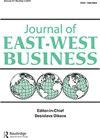中国企业间联盟中的机会主义:非对称依赖与关系治理效应
IF 0.9
Q4 BUSINESS
引用次数: 0
摘要
在联盟研究中,机会主义通常被认为是企业间合作的重要障碍,因为它阻碍了企业间的信任,阻碍了联盟的发展,增加了联盟失败的可能性。本文在前人机会主义研究的基础上,提出了中国企业行动者机会主义在很大程度上受合作伙伴不对称依赖和关系治理两组企业间关系影响的假设。来自109个台湾资讯电子企业联盟的数据支持了研究假设。本文章由计算机程序翻译,如有差异,请以英文原文为准。
Opportunism in Chinese Interfirm Alliances: Effects of Asymmetric Dependence and Guanxi Governance
Abstract In alliance studies, opportunism is generally considered a critical obstacle to interfirm cooperation, as it hampers interfirm confidence, impedes alliance evolution, and increases the probability of alliance failure. This study extends the prior opportunism studies by hypothesizing that actor opportunism in Chinese business will be largely affected by two sets of interfirm relationships: partners’ asymmetric dependence and guanxi governance. Data from 109 alliances undertaken by Taiwanese information and electronic firms supported the research hypotheses.
求助全文
通过发布文献求助,成功后即可免费获取论文全文。
去求助
来源期刊

Journal of East-West Business
BUSINESS-
CiteScore
2.10
自引率
26.70%
发文量
19
期刊介绍:
Journal of East-West Business is a quarterly journal that deals with contemporary and emerging aspects of business studies, strategies, development, and practice as they relate to the Russian Federation, the new republics of the Commonwealth of Independent States, and Eastern/Central Europe-and business relationships with other countries of the world. The Journal of East-West Business is international in scope and treats business issues from comparative, cross-cultural, and cross-national perspectives. The journal features an Editorial Advisory Board that represents the Russian Federation, Eastern/Central European, and Baltic states in this new business arena.
 求助内容:
求助内容: 应助结果提醒方式:
应助结果提醒方式:


